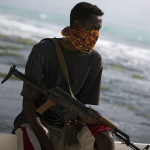Why Can't the West Crack Down on Piracy?
 This week, four Americans were murdered by Somali pirates, the latest proof that the West's attempts to combat this problem are falling short.
This week, four Americans were murdered by Somali pirates, the latest proof that the West's attempts to combat this problem are falling short.
Now that Somali pirates have finally killed some Americans, perhaps a more “robust” policy will be instituted to curb this blight.
Jean and Scott Adams may have been foolish to continue their six-year round-the-world sailing voyage to distribute bibles, when warned to steer clear of the Horn of Africa.
But ignoring advice does not justify them being killed.
And how about their vacationing friends -- Phyllis Macay and Bob Riggle of Seattle, who must have considered this the voyage of a lifetime, unaware that it would be the voyage that ended their lives.
Details are still cloudy, but the fact that the U.S. Navy was on the scene, intent on negotiating with the 19 Somalis who apparently had taken over the yacht, indicates a reluctance to take aggressive action.
Somali pirates know this, and know that their lives are not in danger if they are careful. Even when captured, they know that walking the plank or being hanged from the yard arm is not an option, as it was in the days when Blackbeard, Henry Morgan, and Captain Kidd prowled the Spanish Main.
What seems to have happened on the Adams’ yacht, the Quest, was that a brawl erupted among the pirates about what to do. Firing a rocket propelled grenade against an American warship was so pathetic and pointless that it indicates dissension in the ranks.
Clearly, the Americans were shot and killed while the pirates argued.
A case can be made that piracy is one of those crimes where summary justice is required – not drawn-out trials that end in jail sentences in America.
The Royal Navy and Dutch Navy have, on occasion, captured pirates in the act -- and subsequently released them because they “lacked legal jurisdiction to keep them.” Also, because they feared violating the human rights of the pirates. How ludicrous!
A Canadian warship intercepted pirates a couple of years ago and displayed an international “stop” sign from a helicopter to deter them.
It takes no genius to realize that this deterrence is also pathetic.
In past wars, snipers were summarily executed if taken prisoner, as were captured soldiers in WWI who carried dum-dum bullets.
Somali pirates are hardly of Blackbeard vintage, but unemployed youths working for shore-based bosses whose incomes hinge on ransoming hostages. Hostages who’ve been released tend to appreciate that they haven’t necessarily been abused, and reflect something of a Stockholm syndrome.
That’s not the point.
Right now there are said to be some 650 sailors and individuals and 35 ships being held by Somalia pirates. Ransoms paid run to perhaps $250 million a year, and have resulted in about $12 billion in investment losses.
It strikes me the Indian Navy has the right approach when it sinks “mother ships” from which pirate skiffs attack vessels. With China, Russia, Japan, NATO, the European Union and the UN against piracy, it shouldn’t be a big deal to be rid of them.
Some 27 countries have warships in the hunt for pirates, who’ve expanded into the Indian Ocean and show few signs of being deterred.
That’s probably because the risks are worth the rewards. Even when captured, there’s the likelihood of being released if you are a pirate.
Johnny Depp, where are you?
Leave the Caribbean and come to the Gulf of Aden.
Tweet